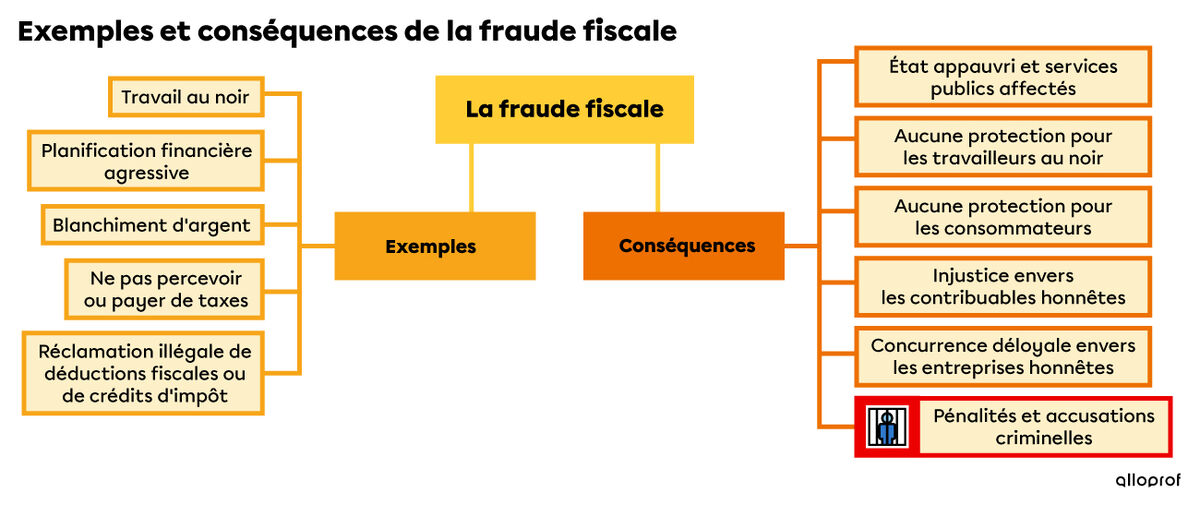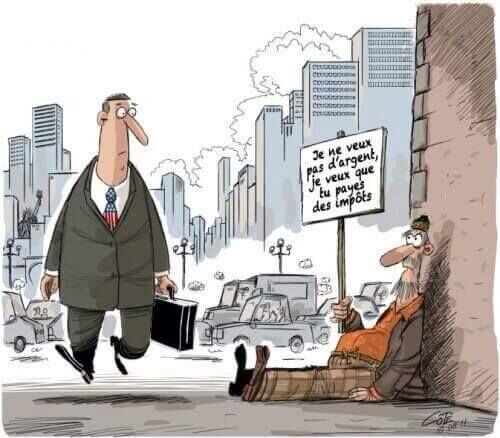In 2015, the Quebec government lost $3.8 billion to tax evasion, an amount representing 4% of the province’s budget. Imagine what a government could do with $3.8 billion a year. The money could be used to improve social programs, a new cancer treatment could be covered by the government and better public transit services could be made available.
What is tax evasion? Tax evasion means not paying taxes when they should be paid. It is illegal, yet many people do not consider it a big deal.
Tax evasion can take many forms, but these are the most common situations:
-
Unpaid or uncollected taxes
-
Working under the table
-
Illegally claiming tax deductions or credits
-
Money laundering
-
Aggressive financial planning
Failing to collect taxes is tax evasion committed by the merchant. Not paying them is also tax fraud for the consumer. These illegal transactions are kept off the books, meaning no bill or receipt is produced. However, you should know that businesses with revenues of less than $30,000 per year do not have to charge goods and services tax.
John goes into a store to buy a pair of jeans. When he is ready to pay, he asks to see the manager. He asks if he can pay the bill in cash so that he does not have to pay tax on his purchase. That way, there will not be any record of the transaction. The manager agrees and proceeds with the transaction, illegally.
Also referred to as “moonlighting,” working under the table is common in the restaurant and construction industries. This practice consists of not declaring your income to the government to avoid paying taxes which contribute to various programs that provide social security.
Not all undeclared earnings are necessarily considered working under the table. For example, babysitting or lawn mowing may not be considered working under the table if the amount earned annually does not exceed the basic non-taxable amount. In 2020, this basic non-taxable amount was $15,532 for the province of Quebec and $13,229 for Canada.
Juliette recently moved to the city to start a social sciences program at a CEGEP. In the summer, she works 40 hours a week as a waitress in a restaurant. During the school year, she works 10 hours a week. All of this work is done illegally: she receives no pay slip, pays no taxes and does not contribute to the Quebec Pension Plan (QPP), the Quebec Parental Insurance Plan (QPIP) or Employment Insurance. She gets paid in cash every week.
Juliette has just applied for Student Financial Assistance and she learns that she will receive a large amount. Juliette is very excited and tells her sister, who has also applied for assistance. Unfortunately, her sister will only get half of what Juliette will receive in loans and bursaries. Why? Since Juliette does not declare her income to the government, it cannot be taken into account in the calculation of loans and bursaries. Working under the table can create unfair situations.
When calculating taxes, there are various credits that reduce the amount to be paid. Some people and businesses claim reductions that they are not entitled to.
Jane calculated her taxes this year and claimed several tax credits without justification. As a result of claiming these credits, she reduced her federal and provincial taxes by $1,500. She claimed tax credits for childcare expenses despite never using childcare this year. Jane made a deal with her neighbour’s daughter to give her a false receipt. She also claimed a tax credit for a home office, even though she has not used it in two years.
Money laundering is concealing money earned illegally by using it in legal activities. An example would be using the money earned from selling drugs to purchase various goods.
Yves has worked for organized crime for years. He does not receive a pay slip. He spends what he earns by paying for his purchases in cash. He pays his rent in cash too and even bought a small motorboat and a used car. Yves works part-time and reports a small income of $20,000 a year, but he actually earns $100,000.
His wife, who owns a small coffee shop, uses much of Yves’ illegal income to inflate the sales of her business. She reports sales that she does not make, putting illegally earned money back into her legally registered business. She makes illegal money look legal.
Aggressive financial planning refers to businesses trying to avoid paying taxes as much as possible. Some businesses use specialists to develop their financial strategy in a way that reduces their payments to the government. This practice is legal, but the goal is illegal.
Daniella owns a business with annual revenues of over $3 million. She feels that she pays too much income tax and decides to hire a financial planner to minimize the money she has to pay to the government. She was able to reduce her taxes by 15% this year.
Tax evasion has important consequences that affect society as a whole, including the government, businesses and individuals.
Money that is not collected by the government cannot then be reinvested in public services, such as health care, education and public transit. By paying their fair share, citizens and businesses help improve these services.
When people work under the table, they are not protected like people who declare their income. For example, if people working under the table are injured on the job, they cannot be compensated. They will not be able to access employment insurance if their employer no longer has work for them. They will not be able to exercise their rights as a worker since, officially, they are not working.
By making purchases under the table, in other words, paying in cash with no receipt, people cannot enforce their consumer rights. If they buy a refrigerator and it malfunctions within a month of purchase, they cannot claim an exchange or refund. Paying taxes and keeping receipts will prevent these types of situations.
People who pay their taxes and declare their income correctly may feel a strong sense of injustice when individuals commit fraud. A person who earns as much money as someone else should not have to pay more tax.
Just like honest individuals, businesses that pay their fair share of taxes can be at a disadvantage compared to those that do not. One business could be performing as well as another, but pay 10% more in taxes, due to unfair competition.
Here is a diagram that summarizes tax evasion and its consequences.

Note: Image in English coming soon.
Now the meaning of the cartoon below is clearer:

“I don't want money, I want you to pay taxes.” (Translation provided by Alloprof)
Cartoonist Côté shows a poor person and a rich person. The poor person asks the rich person to pay taxes instead of giving him money. Why is this?
By collecting taxes from the rich person, the government will redistribute the wealth to the poor person through different social programs, like social assistance or subsidies granted to the local food bank.